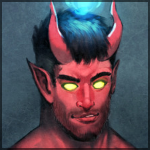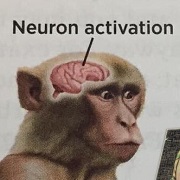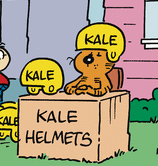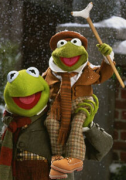|
Bolverkur posted:I can definitely relate to this sentiment. Reading a handful of Lovecraft's short stories in a row puts you in a very strange mindset. Especially if it's before going to sleep and your brain is slowly drifting into a dream-state. Reading a story by Ligotti while slowly, almost-but-not-quite falling asleep is a sublime reading experience. This sums up a lot of why I love weird fiction. Good weird fiction can put you in a certain mood and mindset and it's really awesome. They very best stuff will give me really really strange dreams as well, not generally scary or anything but just, well, weird.
|
|
|
|

|
| # ? May 15, 2024 10:55 |
|
Dunno what that guy's on about, reading Lovecraft makes me nervous.
|
|
|
I read The Shadow Over Innsmouth to my wife and it really unnerved her so 
|
|
|
|
|
I published my Best of Lovecraft anthology. Unfortunately Amazon is not convinced his stories are in the public domain, so they won't let me sell it. If there's any interest in the eBook I'll send it to ya or post a link here or something (I mean, you can get those stories anywhere, but this one has pictures!)
|
|
|
|
Hell yes.
|
|
|
|
ravenkult posted:I published my Best of Lovecraft anthology. Unfortunately Amazon is not convinced his stories are in the public domain, so they won't let me sell it. If there's any interest in the eBook I'll send it to ya or post a link here or something (I mean, you can get those stories anywhere, but this one has pictures!) He's been dead 78 years, what more do they want?
|
|
|
|
Pope Guilty posted:He's been dead 78 years, what more do they want? Well it's Amazon, so. Anyway, here's my trash ebook, enjoy https://payhip.com/b/7RDN
|
|
|
|
PayHip posted:You don't have permission to access /b/7RDN on this server.
|
|
|
|
You are not hip enough to pay.
|
|
|
|
Copy paste the link instead. Don't know why it's doing that, sorry.
|
|
|
|
Forgall posted:You are not hip enough to pay. I used to be with it, but then they changed what "it" was. Now, what I'm with isn't it, and what's "it" seems weird and scary to me. It'll happen to you!
|
|
|
|
Just finished Brian Hodge's "World of Hurt", and while definitely a well written story, I didn't enjoy it at all. I went into it thinking it was going to be cosmic horror along the lines of "Whom The Gods Would Destroy" but it's pretty much just straight gory horror/nonstop pessimism which I find dull. I REALLY loved "The Events at Poroth Farm" by TED Klein though, so thanks a lot to the people ITT who recommended it. I just wish his "Dark Gods" collection was available on Kindle.
|
|
|
|
Vorik posted:I REALLY loved "The Events at Poroth Farm" by TED Klein though, so thanks a lot to the people ITT who recommended it. I just wish his "Dark Gods" collection was available on Kindle. The full length novel he turned that story into, The Ceremonies, is very very excellent as well. He's always been a curiosity to me as an author. Seemed to have had a wonderful talent and voice for horror writing, and didn't really get a chance to do much with it beyond the relatively scant body of his work that's available. Shaquin fucked around with this message at 10:31 on Nov 6, 2015 |
|
|
|
Shaquin posted:The full length novel he turned that story into, The Ceremonies, is very very excellent as well. He's always been a curiosity to me as an author. Seemed to have had a wonderful talent and voice for horror writing, and didn't really get a chance to do much with it beyond the relatively scant body of his work that's available. Tried very hard to track this down for an ereader (whether legally or otherwise) a year ago to no avail. I really liked Dark Gods.
|
|
|
Neurosis posted:Tried very hard to track this down for an ereader (whether legally or otherwise) a year ago to no avail. I really liked Dark Gods. If you just want to read it, you can get copies for a penny plus shipping on Amazon. You probably wasted more in time looking for an electronic copy.
|
|
|
|
Neurosis posted:Tried very hard to track this down for an ereader (whether legally or otherwise) a year ago to no avail. I really liked Dark Gods. There are ways to get all the stories in Dark Gods, but not the collection itself.
|
|
|
|
|
Good article on the staying power of Lovecraft's work from Slate. I hadn't considered the environmental horror slant of Lovecraft's and other weird fiction writer's work, but it is certainly there. http://www.slate.com/articles/technology/future_tense/2015/10/h_p_lovecraft_and_the_environmental_horror_of_the_21st_century.html quote:A great story changes with the times. Decades after it’s published, a narrative with depth and dimension will still give up secrets, signifying different things to each generation. But this feat is particularly tricky in the horror genre, since society’s fears—the fuel in any good horror story—can change significantly over time. A story that can still terrify readers 90 years after it’s published is a rare thing.
|
|
|
|
quote:It has come to my attention that the World Fantasy Convention has decided to replace the bust of H. P. Lovecraft that constitutes the World Fantasy Award with some other figure. Evidently this move was meant to placate the shrill whining of a handful of social justice warriors who believe that a “vicious racist” like Lovecraft has no business being honoured by such an award. (Let it pass that analogous accusations could be made about Bram Stoker and John W. Campbell, Jr., who also have awards named after them. These figures do not seem to elicit the outrage of the SJWs.) Accordingly, I have returned my two World Fantasy Awards to the co-chairman of the WFC board, David G. Hartwell. ST Joshi is pissed they're changing the Lovecraft bust. What a massive overreaction though.
|
|
|
|
ST Joshi made his name with Lovecraft scholarship. Not suprised he is that angry.
|
|
|
|
The phrase "shrill whining of a handful of social justice warriors" is a pretty good shibboleth for someone whose opinions aren't worth listening to, at least on the subject immediately at hand. That said, the switch of the award does seem a little bit like pearl-clutching. As far as I'm aware, nobody was under the impression or has argued that Lovecraft's racism is a selling point or that his work wouldn't, all things being equal, be better off without it (I'm talking here about his racism against real-world races that have the potential to be hurt by it, and not the horror tropes that may have been informed by his racism, like miscegnation with fish-people). It's been generally understood for decades that Lovecraft's work is to be enjoyed (by those who enjoy it) very much despite its racism, and I don't think anything has newly come to mind to indicate that he was actually a super duper double saiyan racist.
|
|
|
|
You might as well throw out the classic canon of SF and fantasy if terrible opinions held by dead people are that worrysome. I wish people could just accept that temporal context means something and that these people had horrible opinions by modern standards--because they weren't modern people--and just leave it at that. No one loves Lovecraft because of his ethics or moral stances. His influence is undeniable, regardless of how much of a racist weirdo he was back when the Teapot Dome scandal was a hot-button current event.
|
|
|
|
Fritz Lieber was a great author and not comically terrible as a person.
|
|
|
|
Tim Waggoner (doesn't write cosmic horror, but he does write horror) had a great status on Facebook the other day, questioning why we don't mind having a Poe award all that much, considering he was pro-slavery and married his 13-year old cousin. While it's largely pointless (plenty of terrible authors are admired today) it was hilarious watching nerds doing mental gymnastics to explain away pedophilia. One lady's opinion was that racism is a big problem in the US, while ''children brides'' aren't, so why should we care about that kind of stuff?
|
|
|
|
Xotl posted:You might as well throw out the classic canon of SF and fantasy if terrible opinions held by dead people are that worrysome. I wish people could just accept that temporal context means something and that these people had horrible opinions by modern standards--because they weren't modern people--and just leave it at that. No one loves Lovecraft because of his ethics or moral stances. His influence is undeniable, regardless of how much of a racist weirdo he was back when the Teapot Dome scandal was a hot-button current event. There's still room to criticize Lovecraft's viewpoints even in a temporal context, insofar as there were absolutely people--writers, even--who held much better views on race in his day and before. It's a pretty low bar, after all. This said, it's an award for work in the fantasy genre, not an award for social viewpoints. On the other hand, there are a lot more prominent minority writers of fantasy these days than there would have been forty years ago, and I can get behind the argument that they should be able to avoid being given an award that reminds them of someone who hated them and wrote horrible things about them. Maybe they should use a bust of Cthulhu, if they want to make it clear that it's about the work/mythos and not the man? I have to say I'm surprised that Lovecraft's name would be shortlisted to represent "fantasy" in the first place. I'd have thought that you'd go with someone like Tolkien (who, of course, had his own problems with racial themes, but c'est la vie) or Howard if you want to stick with the pulps. I guess Lovecraft has the advantage of being instantly recognizable in caricature, though. ravenkult posted:Tim Waggoner (doesn't write cosmic horror, but he does write horror) had a great status on Facebook the other day, questioning why we don't mind having a Poe award all that much, considering he was pro-slavery and married his 13-year old cousin. While it's largely pointless (plenty of terrible authors are admired today) it was hilarious watching nerds doing mental gymnastics to explain away pedophilia. People are flawed and horrible generally, and while it's probably worthwhile excising the worst of the worst from contexts of admiration ( One problem, is that once you skim off the Hitlers and Mengeles, everyone's idea of who's in their top ten worst human beings in X field is going to be colored by their own perspective. Black authors quite understandably might respond poorly to Lovecraft, whereas someone who was a victim of sexual abuse and knows about Poe's tendencies (or even, poo poo, Lewis Carroll's) is going to have a bad time with anything that lionizes them. When it comes to major awards and stuff we can probably avoid putting a face on them (literally) that calls back to this sort of stuff, but in a larger context we need to be able to deal, because if we go through the canon like we were striking off jury candidates we're going to end up pretty impoverished. JerryLee fucked around with this message at 14:34 on Nov 13, 2015 |
|
|
|
It wasn't a great likeness of Lovecraft anyway, it looked more like Marty Feldman imo
|
|
|
|
|
ravenkult posted:Tim Waggoner (doesn't write cosmic horror, but he does write horror) had a great status on Facebook the other day, questioning why we don't mind having a Poe award all that much, considering he was pro-slavery and married his 13-year old cousin. While it's largely pointless (plenty of terrible authors are admired today) it was hilarious watching nerds doing mental gymnastics to explain away pedophilia. The thing is, child brides and slaves don't show up much in Poe's stories.
|
|
|
|
If you're not interpreting fish people as ''immigrants,'' racism doesn't show up in his stories too much either.
|
|
|
|
Xotl posted:You might as well throw out the classic canon of SF and fantasy if terrible opinions held by dead people are that worrysome. I wish people could just accept that temporal context means something and that these people had horrible opinions by modern standards--because they weren't modern people--and just leave it at that. No one loves Lovecraft because of his ethics or moral stances. His influence is undeniable, regardless of how much of a racist weirdo he was back when the Teapot Dome scandal was a hot-button current event. Maturity and logic is significantly lacking amoung some individuals of adult age. Edit: and I did find the bust of Lovecraft's head pop-eyed and weird looking but maybe that was the artists intended effect? 
|
|
|
|
ravenkult posted:If you're not interpreting fish people as ''immigrants,'' racism doesn't show up in his stories too much either. It really does, though? Just to grab the last one I read/listened to recently, The Call of Cthulhu is pretty explicit in tying Cthulhu's cult to Eskimos and poo poo.
|
|
|
ravenkult posted:Tim Waggoner (doesn't write cosmic horror, but he does write horror) Just wanted to chime in and mention that Waggoner does write cosmic horror, though it isn't his main focus in the genre. The Last Mile is pretty damned good.
|
|
|
|
|
General Battuta posted:It really does, though? Just to grab the last one I read/listened to recently, The Call of Cthulhu is pretty explicit in tying Cthulhu's cult to Eskimos and poo poo. You didn't read it carefully enough then. This is the problem I have with most of Lovecraft's critics based on racism. They didn't do their diligence in terms of reading the literature or have the maturity to recognize it came from another time or the critical analysis to understand what was the purpose of a particular literary passage. From Call of Cthulhu quote:Professor Webb had been engaged, forty-eight years before, in a tour of Greenland and Iceland in search of some Runic inscriptions which he failed to unearth; and whilst high up on the West Greenland coast had encountered a singular tribe or cult of degenerate Esquimaux whose religion, a curious form of devil-worship, chilled him with its deliberate bloodthirstiness and repulsiveness. It was a faith of which other Esquimaux knew little, and which they mentioned only with shudders, saying that it had come down from horribly ancient aeons before ever the world was made. Besides nameless rites and human sacrifices there were certain queer hereditary rituals addressed to a supreme elder devil or tornasuk; and of this Professor Webb had taken a careful phonetic copy from an aged angekok or wizard-priest, expressing the sounds in Roman letters as best he knew how. But just now of prime significance was the fetish which this cult had cherished, and around which they danced when the aurora leaped high over the ice cliffs. It was, the professor stated, a very crude bas-relief of stone, comprising a hideous picture and some cryptic writing. And so far as he could tell, it was a rough parallel in all essential features of the bestial thing now lying before the meeting. It is clear from the first bolded section that the "Eskimos" who were affected by the cult were a tribe shunned by the normal Eskimoes. A similar distinction is made between the Louisiana cultists and the "normal" human population. The point being that the Mythos corrupts a population and makes the non-Mythos population shun them. You see the same distinction in the Shadow Over Innsmouth where the Deep One allied Island tribe is hated by the other local tribes. The reason for mentioning Eskimos at all is in the second bolded point. It shows that the Mythos has consistency in worship despite it's global reach. There is racism in Lovecraft's work, but only idiots (and I'm including so called literature teachers here) say "Look! Native People! Evil Cults! Racist!" People don't know how to loving read.
|
|
|
|
You did a good reading there, I see your point! I think it's a little unfair to accuse someone of illiteracy for an off-the-cuff forum post. Thank you for doing an effortpost, it's cool to see it like that.
|
|
|
|
I appreciate that I'm being an rear end in a top hat and that you appreciate the point. May you have many successes in your travels.
|
|
|
|
I was reading an Interview with Steven King on the Rolling Stone site that was published back in 2014. King had some interesting things to say about literary critics that outright bash a book without reading it. To be specific, this is not a response to General Battuta; he actually bothered to read Call of Cthulhu. It just illustrates a long term problem in literary criticism that has been recently been directed towards Lovecraft. And why post this in Cosmic Horror and Weird Tales? Well there is a thing he just casually mentioned that sent a shiver of existential dread up my spine. I hope someone turns that idea into a piece of fiction. http://www.rollingstone.com/culture/features/stephen-king-the-rolling-stone-interview-20141031 quote:The vast majority of your books deal with either horror or the supernatural. What drew you toward those subjects? King's thoughts on Evil and life in the cosmos quote:How about evil? Do you believe there is such a thing?
|
|
|
|
That's pretty awesome/chilling.
|
|
|
|
It's a pretty well known ''theory,'' but I forget the name.
|
|
|
|
If you remember the name please post it. Edit: Helical Nightmares fucked around with this message at 02:54 on Nov 14, 2015 |
|
|
|
It's part of the Fermi paradox, which shows up in mythos style horror a lot (in the sense that the reason there aren't any civilizations out there is because there's something that keeps eating them as they hit a certain level of advancement, among others). https://en.wikipedia.org/wiki/Fermi_paradox It's also called "The Great Filter" https://en.wikipedia.org/wiki/Great_Filter hopterque fucked around with this message at 02:50 on Nov 14, 2015 |
|
|
|
See also: Mass Effect Blindsight, by Peter Watts, has probably my favorite take on the Fermi paradox and I'd say it qualifies as cosmic horror.
|
|
|
|

|
| # ? May 15, 2024 10:55 |
|
It's the Shivans, actually.TheWhiteNightmare posted:See also: Mass Effect Although this book is loving excellent, and accomplishes the feat of proving that hard science fiction (for the right values of hard) must be cosmic horror.
|
|
|






















